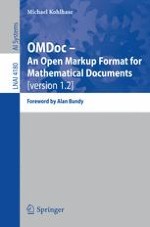2006 | OriginalPaper | Buchkapitel
Document Models for OMDoc
verfasst von : Michael Kohlhase
Erschienen in: OMDoc – An Open Markup Format for Mathematical Documents [version 1.2]
Verlag: Springer Berlin Heidelberg
Aktivieren Sie unsere intelligente Suche, um passende Fachinhalte oder Patente zu finden.
Wählen Sie Textabschnitte aus um mit Künstlicher Intelligenz passenden Patente zu finden. powered by
Markieren Sie Textabschnitte, um KI-gestützt weitere passende Inhalte zu finden. powered by
In almost all XML applications, there is a tension between the document view and the object view of data; after all, XML is a document-oriented interoperability framework for exchanging data objects. The question, which view is the correct one for XML in general is hotly debated among XML theorists. In
OMDoc
, actually both views make sense in various ways. Mathematical documents are the objects we try to formalize, they contain knowledge about mathematical objects that are encoded as formulae, and we arrive at content markup for mathematical documents by treating knowledge fragments (statements and theories) as objects in their own right that can be inspected and reasoned about.
In Chapters 13 to 21, we have defined what
OMDoc
documents look like and motivated this by the mathematical objects they encode. But we have not really defined the properties of these documents as objects themselves (we will speak of the
OMDoc
document object model
(OMDOM)). To get a feeling for the issues involved, let us take stock of what we mean by the object view of data. In mathematics, when we define a class of mathematical objects (e.g. vector spaces), we have to say which objects belong to this class, and when they are to be considered equal (e.g. vector spaces are equal, iff they are isomorphic). When defining the intended behavior of operations, we need to care only about objects of this class, and we can only make use of properties that are invariant under object equality. In particular, we cannot use properties of a particular realization of a vector space that are not preserved under isomorphism. For document models, we do the same, only that the objects are documents.
